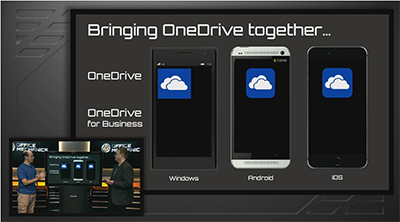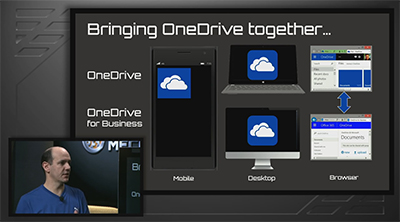News
Microsoft Releases Updated OneDrive App for iOS and Mac Sync Preview
Microsoft released an updated OneDrive app for iOS devices this week as part of its broader efforts to deliver a unified business and personal cloud storage experience.
This updated OneDrive app for iOS can be downloaded from the Apple iTunes store here. Although it might be considered to be a consumer app, the updated iOS app has the capability to handle storage for both work files and consumer files, according to Microsoft's announcement. It's possible to use this app to upload files to OneDrive for Business, Microsoft explained in a January 28 OneDrive blog post.
In addition, the updated OneDrive app for iOS has new photo-sharing capabilities via "albums," a feature that also will be coming at an unspecified future date to the Windows Phone and Android platforms, according to a January 27 OneDrive blog post. Microsoft is also planning to enable 30GB of storage with automatic photo backups turned on in OneDrive. It's now possible to search for photos, Office documents and PDFs via metadata "tags." Another new capability in the iOS app is the ability to recover files from the Recycle Bin.
Microsoft's OneDrive for Business service, which is offered through its Office 365 plans and which is separate from the OneDrive consumer service, currently does yet not have this unified business and consumer storage capability, according to a Microsoft spokesperson, via a phone call. The OneDrive for Business service gets accessed by end users through a browser. Microsoft also offers OneDrive client applications for consumers as mobile apps and desktop apps.
Mobile Apps
Reuben Krippner, director of OneDrive for Business, explained in an Office Mechanics video this week that Microsoft has now produced OneDrive mobile apps for iOS, Windows Phone and Android that allows users to save their work and personal files to Microsoft's cloud-based storage service.
"We've delivered now a new OneDrive app for iOS today that unifies that single experience between personal and business OneDrive in one app, and we've already delivered that on Windows Phone and Android previously, so now it completes that mobile experience across all devices," Krippner said in the video.
 [Click on image for larger view.]
Windows, Android and iOS mobile devices can now save to OneDrive and OneDrive to Business. Source: Microsoft video.
[Click on image for larger view.]
Windows, Android and iOS mobile devices can now save to OneDrive and OneDrive to Business. Source: Microsoft video.
Microsoft's plan for OneDrive is to deliver "a single experience across consumer and business OneDrive" that permits the management of personal and business files. In that regard, it's also working on creating a single desktop synchronization solution for PCs and Macs, as well as a unified OneDrive browser experience.
"The next phase or the next objective for us is to unify the PC and the Mac," Krippner said. "So, that is, have one sync client for PC that covers both personal and business and the same for Mac. So that consolidates the desktop. And finally, we want to drive a unified experience across the browser."
 [Click on image for larger view.]
Microsoft is building a single OneDrive sync engine for mobile, desktop and browser. Source: Microsoft video.
[Click on image for larger view.]
Microsoft is building a single OneDrive sync engine for mobile, desktop and browser. Source: Microsoft video.
Unified Sync Engine
To that end, Microsoft announced the release this week of a "OneDrive for Business Mac sync client preview." This Mac sync preview can be downloaded from the Microsoft Download Center here.
Microsoft has previously alluded to its efforts to unify synchronization for its OneDrive services in the context of Windows 10. When that operating system gets released, it will rely on the older sync engine associated with Windows 7 and Windows 8. A different sync engine associated with Windows 8.1 has had problems, Microsoft admitted.
While Microsoft seems to be blurring the lines between OneDrive and OneDrive for Business with its announcements, it's still also making the claim that organizations will have management controls -- that is, if they are using the OneDrive for Business solution that comes with Office 365 subscriptions. For instance, OneDrive for Business storage comes with encryption capabilities, as well as the ability to prevent inadvertent information disclosures through Microsoft's data loss prevention solution. Policies can be set by organizations via the Office 365 "compliance center."
In the "next few months," Microsoft plans to roll out new auditing capabilities for SharePoint and OneDrive for Business, according to Krippner. These auditing capabilities will permit organizations to search for things such as user activity over a particular date range, for instance.
About the Author
Kurt Mackie is senior news producer for 1105 Media's Converge360 group.